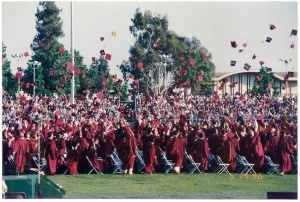Overcrowded Schools and Student Learning
At this time of the year, schools in my district begin planning the teaching assignments for the following year. As we worked on the teacher matrix we took into account the complexities around which year-round schools must maneuver: the number of English Learners on each track, equity and access to all programs, a balance of teacher experience across tracks, etc. “I’m glad it’s the last time we have to deal with this,” commented one department chair. Then it hit me; as of 2012, there would be no more year-round schools left in Los Angeles, this being the legacy of Governor Roy Romer and his school construction program.
For as long as I can remember, I have attended or worked in year-round schools. The memory of carrying boxes for my teacher, from one room to the next, as a 4th grader, is indelibly recorded in my mind. The majority of my 15 years of teaching has involved a careful choreography of rooms between two other teachers and myself, as to who gets which cabinet to store their materials, which visual aids should be left on the wall, and how we prefer our chairs to be arranged. All of this, of course, has an impact on student learning.
Setting up a classroom is something that takes weeks to do. Most teachers in a year-round school rarely have the luxury of time in setting up their rooms. In Los Angeles, teachers get exactly half a day, because students from the outgoing track are dismissed at 12:30 pm. The teachers are given access to their rooms shortly
Thank You Notes
 A few weeks ago, I came home from a particularly long day at school to find a wonderful surprise in my mailbox. One of my advisory students, a young woman I had as a student for seven years, sent me an unsolicited two-page letter. She attached a short note to the letter saying that, after all the letters of recommendation I wrote for her, she wanted to write one for me because “you can never have too many letters of recommendation.”
A few weeks ago, I came home from a particularly long day at school to find a wonderful surprise in my mailbox. One of my advisory students, a young woman I had as a student for seven years, sent me an unsolicited two-page letter. She attached a short note to the letter saying that, after all the letters of recommendation I wrote for her, she wanted to write one for me because “you can never have too many letters of recommendation.”
Her letter included the following: “What makes Ms. Kovacic such an amazing teacher is that she acknowledges every situation, whether good or bad, can be used as an opportunity to learn. She does not settle on textbooks or worksheets to do her teaching, but rather recognizes she is a vessel that can be used to have a lasting impact. Her lessons reach far beyond the classroom. She has taught me to believe in myself, even in the
For as long as I can remember, I have attended or worked in year-round schools. The memory of carrying boxes for my teacher, from one room to the next, as a 4th grader, is indelibly recorded in my mind. The majority of my 15 years of teaching has involved a careful choreography of rooms between two other teachers and myself, as to who gets which cabinet to store their materials, which visual aids should be left on the wall, and how we prefer our chairs to be arranged. All of this, of course, has an impact on student learning.
Setting up a classroom is something that takes weeks to do. Most teachers in a year-round school rarely have the luxury of time in setting up their rooms. In Los Angeles, teachers get exactly half a day, because students from the outgoing track are dismissed at 12:30 pm. The teachers are given access to their rooms shortly
Thank You Notes
 A few weeks ago, I came home from a particularly long day at school to find a wonderful surprise in my mailbox. One of my advisory students, a young woman I had as a student for seven years, sent me an unsolicited two-page letter. She attached a short note to the letter saying that, after all the letters of recommendation I wrote for her, she wanted to write one for me because “you can never have too many letters of recommendation.”
A few weeks ago, I came home from a particularly long day at school to find a wonderful surprise in my mailbox. One of my advisory students, a young woman I had as a student for seven years, sent me an unsolicited two-page letter. She attached a short note to the letter saying that, after all the letters of recommendation I wrote for her, she wanted to write one for me because “you can never have too many letters of recommendation.”Her letter included the following: “What makes Ms. Kovacic such an amazing teacher is that she acknowledges every situation, whether good or bad, can be used as an opportunity to learn. She does not settle on textbooks or worksheets to do her teaching, but rather recognizes she is a vessel that can be used to have a lasting impact. Her lessons reach far beyond the classroom. She has taught me to believe in myself, even in the

